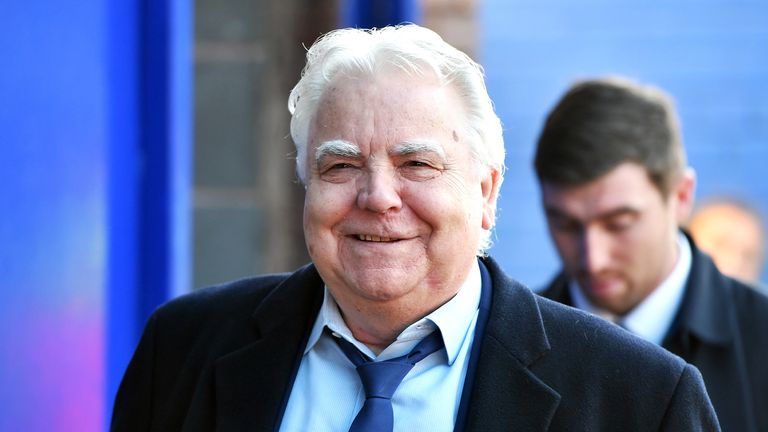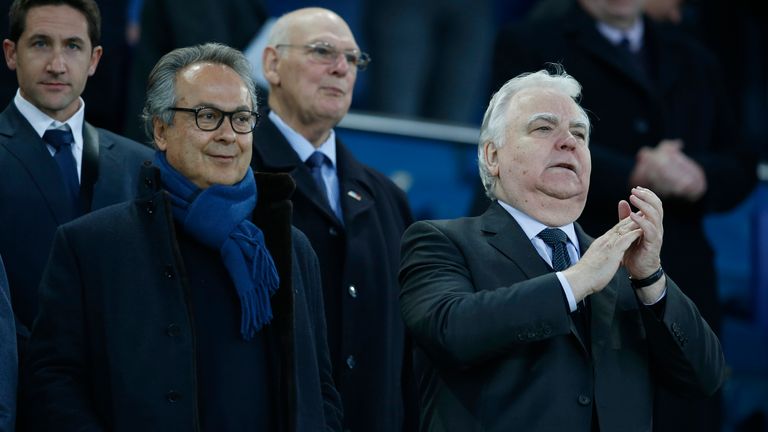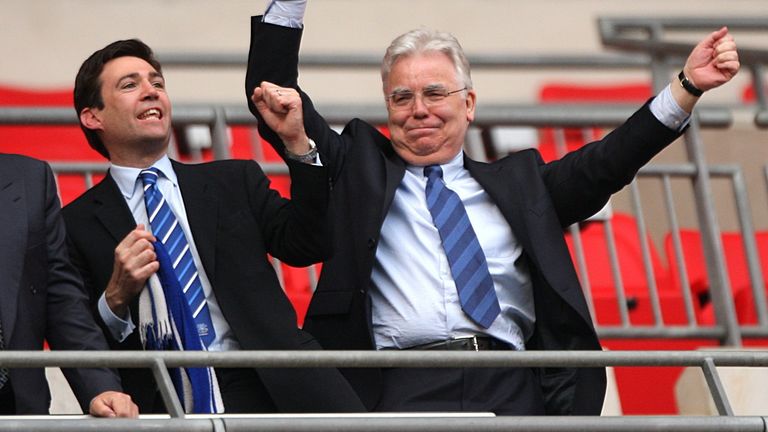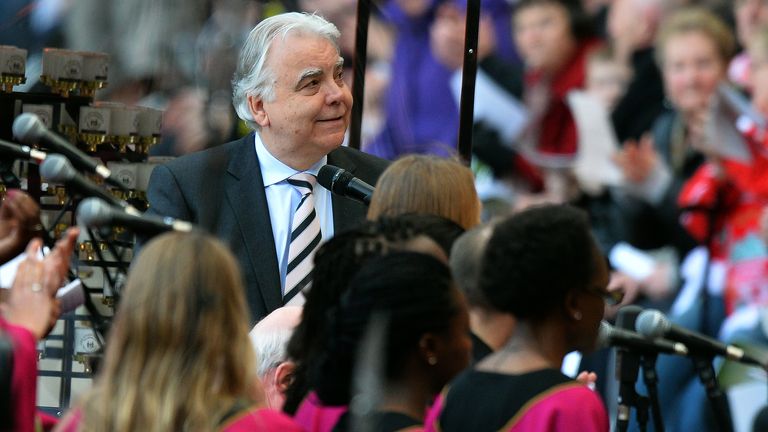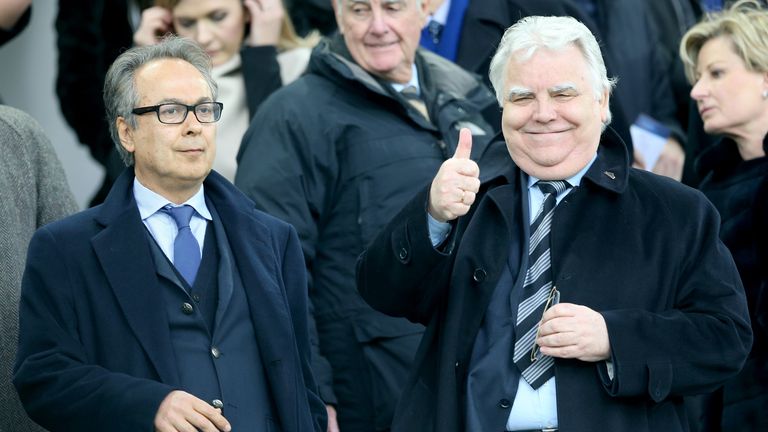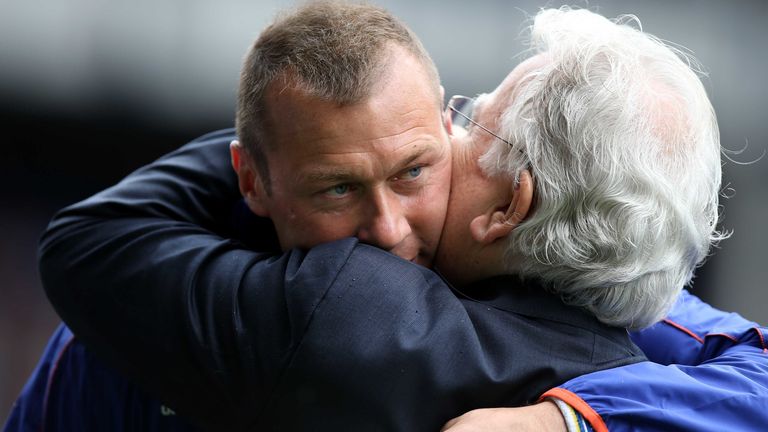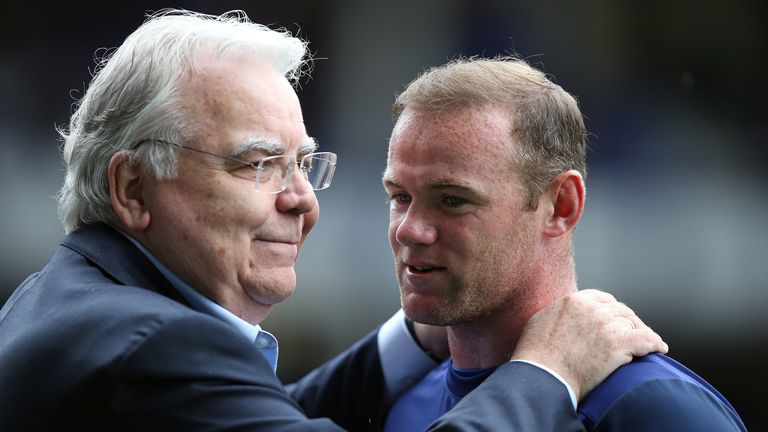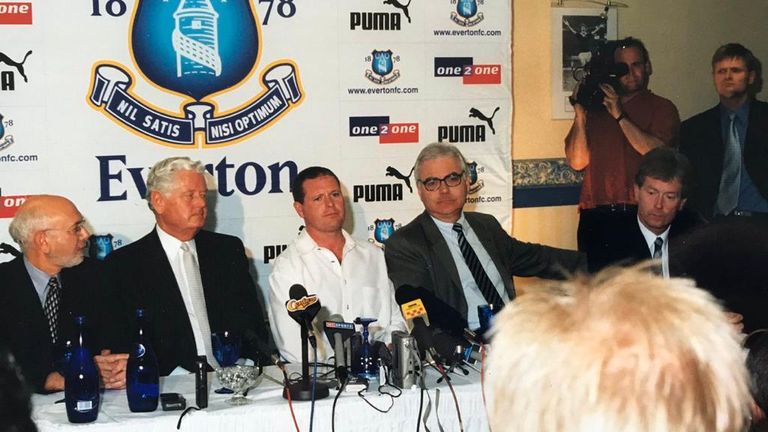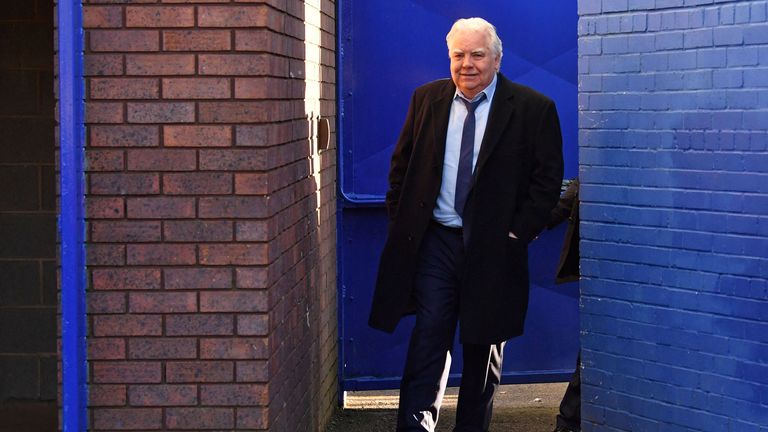Bill Kenwright gave his all to Everton - the club he loved as a child and fought until the bitter end to fix
Bill Kenwright joined the board at Everton in 1989 and became deputy chairman a decade later after buying a majority share; His legacy won't be bricks and mortar at Bramley Moore Dock, it will be that he gave his all to the club he loved as a child, writes Alan Myers
Wednesday 25 October 2023 15:25, UK
Late one night, around midnight, my phone rang, no hello, just a voice saying "I've had enough son". I knew instantly it was Bill Kenwright.
Not just because he often called me son, not even because it was midnight, a regular time for him to call, but because of the sheer desperation in his voice.
Despite being a trained actor, Bill Kenwright couldn't hide his emotions when it came to Everton football club. The team had been on a losing streak and he was feeling the pressure, he needed to talk, to vent his frustration with a like-minded confidant.
He was contemplating resigning as Everton chairman. We spoke until 2am eventually getting around to discussing who our favourite players to wear the royal blue shirt were.
By now he'd forgotten his earlier dilemma, everything was OK again. He called me a few days later to thank me for stopping him doing something he said he would've regretted.
This, however, was not during the relative tumultuous madness of recent seasons. This was a good few years back, before Farhad Moshiri had arrived, but when running Everton was still a slog, a challenge but for Kenwright also a labour of love.
A far cry from Christmas Eve 1999, when a new millennium ushered in a new dawn at Goodison Park.
Sat at home in Liverpool, in my role as Everton's press officer, I received yet another midnight phone call.
This time a joyous, ecstatic Kenwright who had just acquired his boyhood football club with the intention to lift it from the dark days of the Peter Johnson era, was on the other end of the line.
"Get this statement out Al" he shouted. A bright new start under the stewardship of the True Blue Holdings consortium had begun, amid the backdrop of the Christmas tree lights in my living room.
However, the dream was never really able to be realised in the way Kenwright and his partners had envisaged, football had changed, wealth had accelerated and the big money clubs had arrived.
Everton kept its head above water, but the phrase 'punching above their weight' was all too often used to describe the club. David Moyes' managerial heroics and a team of hard working, honest professionals masked the financial challenges they faced season after season.
Young sensation Wayne Rooney was sacrificed to keep the wolves from the door, although inevitable anyway, the wonder kid would leave to join Manchester United to effectively balance the books.
It was another late night appointment as I was promised an interview once the deal had been done, in the darkness outside Kenwright's London office he appeared, tired from the negotiations, he knew it had to be done but the Evertonian in him wished it could've been different.
In another interview, Kenwright once told me, "Everton doesn't need a millionaire - it needs a billionaire". He knew he couldn't provide the sort of money to challenge the now 'top-six' group of clubs owned by the likes of Abramovich, Mansour and Kroenke, he needed investment.
In the meantime, the ageing Goodison had many a facelift, papering over the fragility as the self-proclaimed 'People's Club' continued to upset the odds on the pitch.
There were relative successes along the way, a Champions league placing in 2005, an FA Cup final in 2009, and a few European adventures but all failed to bring the one thing Kenwright and the fans longed for: silverware.
That Champions League qualification meant so much to Bill. Everton had beaten Newcastle on the Saturday, but needed Liverpool to drop points against Arsenal on the Sunday to confirm qualification.
I asked him if I could come down to his home in London and be there on the final whistle of the Liverpool game, so I could film his reaction. He agreed.
It was a tense afternoon but after a 3-1 win for Arsenal, his dream had come true.
He opened a bottle of champagne in his front garden with long-time partner Jenny Seagrove to celebrate. As I left his house to go back to Sky studios, he passed me a CD by The Beautiful South.
The song was 'This will be our Year'. He said, "I've been waiting too long to give you this, but this will be our year Al."
Despite the barren trophy years, Everton under Bill appeared stable, well-run and decent, while all the time peddling furiously under the water to keep afloat.
He wanted Everton to be seen as a club to be admired and respected. I recall, when I'd returned to the club as director of communications in 2013, I wanted to put out a statement critical of a bid from Manchester United for two of the club's players.
I sent Bill a draft copy, it was strongly worded. He called me straight back and said: "That's a bit harsh Al! Can you tone it down a bit?"
He was uncomfortable at the confrontational approach towards another club, we agreed to change a few words. It was the Everton he felt reflected the way he did business, in a traditional manner.
Then, of course, the billionaire was found. Moshiri's arrival signalled the end of everyone's troubles, or so it seemed. This was it! Utopia!
Kenwright had found what he and Everton had been looking for. He remained as chairman in the new set-up, seen by the new owner as the local knowledge and the man who had the best interests of the club at heart.
A new spectacular stadium would actually happen, after three previous failures, and the club looked like shaking its 'party pooper' image and becoming a credible contender.
But poor recruitment, a catalogue of bad decisions and ultimately a war in Ukraine turned the dream into a bit of a nightmare.
The club found itself in successive relegation battles, and the focus of attention fell back onto Kenwright and his board.
The failure to bring a trophy to the club in his 20-odd years of chairmanship had turned the spotlight back onto the lifelong Evertonian. Fans demanded change. They'd had enough and they told him.
Kenwright and his board were advised not to turn up to games for their own safety by the club's own security department - something he vehemently opposed. He wanted to attend and face the fire.
After all, he'd had some challenging moments in the past, so it didn't phase him. It did however hurt him. He needed his Goodison fix, he needed the crowds, the excitement, the theatre impresario needed the theatre of Premier League football. It was his life and his love.
In his last year or so in particular, Bill suffered tremendously with health issues, operations and investigations were commonplace in his life, but during this time he clung onto his primal instincts to keep working.
It was a drug to him, despite many friends pleading with him to step aside and put his health first. Whatever the reasons, and admirable they may have been, a top-flight football club was not the place for a man in his condition.
I knew Bill personally, I shared many moments with him, good, bad and indifferent. I worked for him, argued with him, disagreed with him and shared many happy times with him and low points too in his professional life.
I found him an extremely generous man, in particular when it came to the vulnerable and those in need. He could not turn away from a sad story, he took great pleasure in fixing things for people but fixing Everton had become a mountain too high to climb.
That he won't get to see the opening of the new stadium is a real shame. He knew what that meant and he, like many others, was grateful to Moshiri for making that happen.
Kenwright's legacy won't be bricks and mortar at Bramley Moore Dock though, it will be that he gave his all to the club he loved as a child, albeit without realising as chairman the success that same child witnessed growing up.
He undoubtedly worked tirelessly to achieve success for Everton but success can come in many forms and degrees.
While some understandably will see failure ultimately, there will be many that see the good he tried to bring.
The playwright Tom Stoppard once said, "Every Exit is an Entry Somewhere Else". Bill Kenwright's exit will, I'm sure, provide entry to a fondly remembered page of Everton's history.
Dyche pays tribute to 'amazing servant' Kenwright
Everton manager Sean Dyche has paid tribute to Bill Kenwright, who died on Monday at the age of 78, calling the late chairman "an amazing servant" to the club.
On Wednesday morning, Dyche and club captain Seamus Coleman laid flowers at the statue of Dixie Dean outside Goodison Park, where the Everton squad were holding a training session.
All players and staff observed a minute's silence before the session and Kenwright's image was shown on the stadium's screens.
In a statement on the club website, Dyche said: "It's a very sad time for everyone at Everton Football Club to lose our chairman, someone who has been such an amazing servant to the club in so many ways.
"His influence in bringing me to Everton in the first place was important and I have nothing but gratitude and respect for his unwavering support of myself, the staff and our players.
"It was a pleasure to share the moment of reaching our objective last season with him - a moment I know he felt so strongly about after such an arduous season, on and off the pitch…
"He was an incredible professional, in terms of what he did with Everton and also what he achieved in the theatre industry. Spending time with him and learning about his family, you couldn't help but be taken by his passion."

